Top 10 rites-of-passage movies
Growing up is hard, but at least Hollywood is on hand to walk you through it…
The zit-filled, angst-strewn and generally tormented battlefield of adolescence came into its strongest cinematic focus after the advent of Star Wars proved that it was teenagers themselves who were holding Hollywood’s purse-strings now, which arguably made the 1980s the ‘golden era’ for the ‘coming of age’ movie. Whilst goofball efforts like Animal House and Porkys played to the lowest common denominator, this audience often proved to be susceptible to a more insightful look at what they were going through…
We’ll be skipping the ‘raw recruits’ of war movies such as Full Metal Jacket and Platoon, as they probably deserve their own list – along with all the horror movies that half-cover this territory…
10: Malèna (2000)
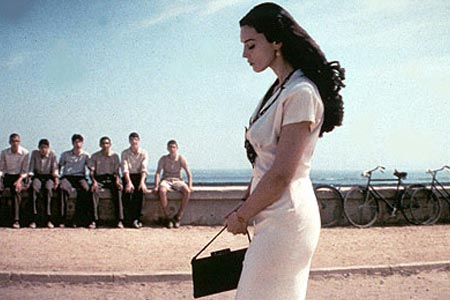
We kick the list off with a couple of ‘older woman’ movies. Here Giuseppe Sulfaro is the Sicilian schoolboy sexually and romantically infatuated with Monica Bellucci, whose husband has left her behind to fight in WWII. La Bellucci is so entrancing that – bereft of her ‘protector’ – the jealous women of the village conspire to alienate her. Left destitute, Bellucci turns to prostitution in order to survive, even consorting with the occupying German forces, which ultimately seals her fate with the women of the village…
This is a beautiful, if typically uncompromising Italian movie detailing a boy’s attempts to sift and separate his growing feelings of romantic and sexual longing. As many other childhood retrospectives do, it risks to leave its central character as a cipher, or just a kind of ‘mobile camera’ to capture someone else’s story; but like The Reader, it finally turns back to its host to leave a searing impression of trapped adolescent passion, desire and redemption.
9: Summer of ’42 (1971)
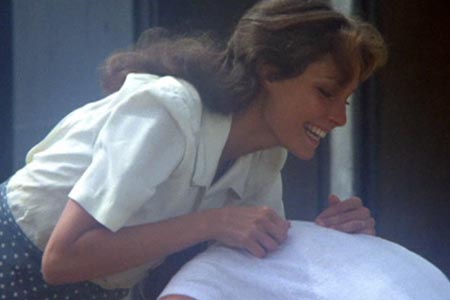
If there’s one thing a little absent in Malèna, it’s the humorous and gawky aspect of growing up. This very similar tale, based on the early experiences of screenwriter Herman Raucher, presents a number of comic scenes to break up the more poignant thread detailing Gary Grimes’ obsession with older woman Jennifer O’Neill. The most memorable is when Grimes repeatedly attempts to buy condoms at a druggist, but always seems to come away with an ice-cream or something else he didn’t intend to buy! This became a bit of a classic scenario later, but I can’t remember any earlier movie that had the audacity to touch on such a tender subject. Of course, Summer Of ’42 also deals with the divergence of childhood friendships as old buddies find that they feel differently towards life and love as they grow older. Grimes has a ‘frat boy’ friend and a ‘nerd’ friend; since he’s neither as sexually pragmatic as the first nor as traumatised as the second, his story really is one of moral choices about the kind of person he’s going to be for the rest of his life.
8: Clueless (1995)
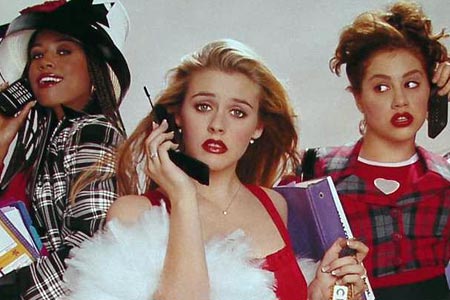
As someone who hates – who truly, truly hates – Jane Austen with the passion that only boys who were forced to study her at school can evince, I was surprised to find that one of her accursed novels had been turned into a film I actually like. Based on the 1815 novel Emma, Clueless tells the story of 16 year-old superficial high-school socialite Alicia Silverstone, whose self-centred attempts to unite two lovelorn teachers (in order to get her grades fixed) reveal to her that she actually likes doing nice things for people. Needless to say her initial success turns out to have been beginner’s luck; her later attempts at matchmaking have rather more varied results, as do her own efforts to find love…
The ‘good-natured superficial chick’ shtick was later to be seriously overdone in Legally Blonde and its successors, but Clueless has the right balance of comedy and painful learning. It’s also – for the chaps – an interesting look into a few ‘girls’ tricks’ on the hard road to adulthood…
7: Interstate 60: Episodes of the Road (2002)
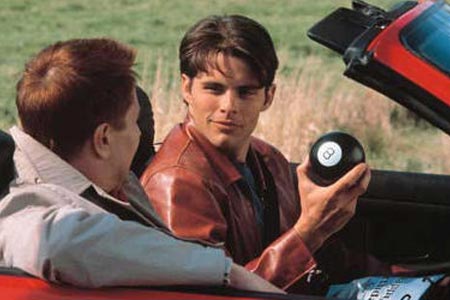
X-Men star James Marsden is the rich-kid who prefers Spider-Man to X-Men (!), and working the night shift at a supermarket to taking hand-outs from his rich and insufferable lawyer father. His dope-head society girlfriend and his overbearing parents have his life mapped out, and it looks like his dream of supporting himself as an artist is out of his reach. Until eccentric leprechaun Gary Oldman decides to grant him his birthday wish – an ‘answer’ to his life.
Oldman’s ‘wishes’ are a test of character – if your moral compass is askew, they can and do kill or ruin the recipient. Marsden’s own ‘wish’ comes in the form of a commission to deliver a sealed package to an unknown recipient, in a town where it’s hinted he’ll meet the love of his life, in the form of poster-girl Amy Smart. He’s to travel via the non-existent Interstate 60, aided only by a rather cryptic magic 8-ball and his own sense of what’s right. On the way he’ll run into a draconian town entirely occupied by lawyers, another where the police have found an unusual solution to the drug problem, a systematic nymphomaniac who challenges him to be the ‘perfect fuck’…and a serial killer who threatens to cut his rite-of-passage short…
Usually when Hollywood is too dumb to recognise a good thing, the result is a binned script. In this case it’s the shameful straight-to-DVD release of Back To The Future writer Bob Gale’s biggest and best effort as a director. Featuring some superb cameo performances from the likes of Christopher Lloyd, Michael J. Fox, Gary Oldman, Kurt Russell, Ann Margret and the utterly stunning Chris Cooper (as a dynamite-bound, fire-breathing cancer victim who makes liars tell the truth by threatening to detonate himself!), Interstate 60 is really a ‘lost’ gem.
6: Ferris Bueller’s Day Off (1986)
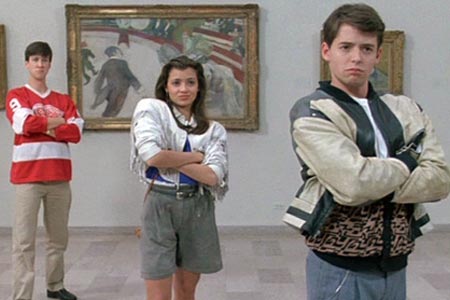
Having struck teen gold yet again with The Breakfast Club (see honourable mentions below), John Hughes continued his teen-screen hit-machine with this tale of a well-deserved ‘goofing off’. Matthew Broderick is the eponymous hero, a congenital but likeable loafer determined to enjoy a day in Chicago with girlfriend Mia Sara and glum pal Alan Ruck before college comes to split them all up.
Naturally Dean Jeffrey Jones is hot on the truanting slacker’s heels, and part of the fun of the unscheduled excursion involves his pursuit of his prey. Meantime Broderick & Co. are having some fine adventures in Chicago along with the Ferrari 250 GT California purloined from Ruck’s dad; the highlight of these japes is Bueller’s masquerade as the ‘Sausage King of Chicago’ in order to gain access to a swanky restaurant.
In terms of plot, Day Off is pretty insubstantial – what makes the film are Broderick’s post-modern asides to camera and the sheer sense of joy at running off the rails and ‘seeing what’s out there’. These aren’t bad kids, and naughty Ferris is the most likeable of all, living out a day off-the-leash in style before doing the right thing with the rest of his life. Day Off is an escape-fantasy we can all remember, that moment when you sneak a quick peek at the freedom that won’t mean quite as much to you by the time you earn it properly.
If Office Space is the movie that helped a generation of desk-jockeys endure their lot, Day Off is arguably the one that got them through high-school.
5: Stand By Me (1986)
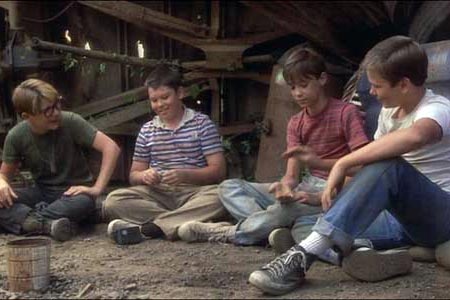
Wil Wheaton stands in for the young (if fictionalised) Stephen King in this adaptation of his excellent 1982 novella The Body. Wheaton and pals River Phoenix, Corey Feldman and Jerry O’Connell are the 1960s hick-kids who take a long country hike to see the body of a kid that they hear has been found out in the bush. All are carrying heavy burdens – Wheaton lives in the shadow of his dead brother, whilst bright spark Phoenix seems destined to be tarred with the criminal brush of his family; Feldman has a dangerous and abusive father and O’Connell – as the ‘school fatty – is the easy target of the bullies who plague all the boys.
If we’re glad to see Ferris Bueller break away from the fold for a while, we’re even happier to see this bunch finally getting to have some fun and adventures together – and sharing their dreams, fears and fantasies with us. Rob Reiner’s take on childhood is probably the closest cinema has yet got to capturing the atmosphere of excitement, fear and regret in Ray Bradbury’s Something Wicked This Way Comes (alas not realised in that book’s own 1983 adaptation – see ‘honourable mentions’ below).
The downbeat back-story in Stand By Me is nicely off-set with a number of comic moments, the grossest of which is Wheaton’s ‘pie-eating contest story’, which develops into a puke-fest only rivalled by Monty Python’s Meaning Of Life.
4: Cinema Paradiso (1988)
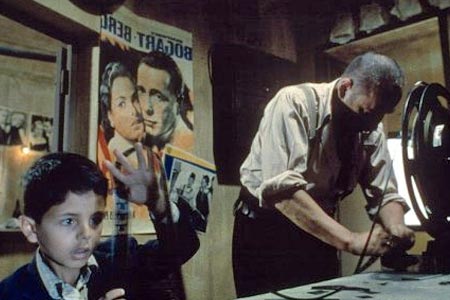
Giuseppe Tornatore’s wistful look at the decline of a cinema in a small Italian town is not only a love-letter to lost childhood, but to the golden age of movies. Salvatore Cascio is the adolescent film director to-be who strikes up a grandfatherly relationship with projectionist Philippe Noiret in post-WWII Sicily. The pair use the wit and wisdom of the films they love to make sense of their lives, and even to survive tragedy together. As Cascio grows up into Marco Leonardi, he’s still relying on the crippled projectionist to help him through life’s hurdles, this time involving the rather Shakespearean problems with his courtship of the daughter of a rich local banker.
It’s Noiret’s later advice to his young friend that really strikes the keynote threading all rites-of-passage movies – the point at which he tells the young man to leave the village in which his great dreams can never come to pass, and not return, not give in to nostalgia. For the young, it’s a daunting thought. For the rest of us, it explains why these movies still have a hook in us later. Like Ferris Bueller, we’re taking a look where we shouldn’t – but in our case, we’re looking back.
3: The Last Picture Show (1971)
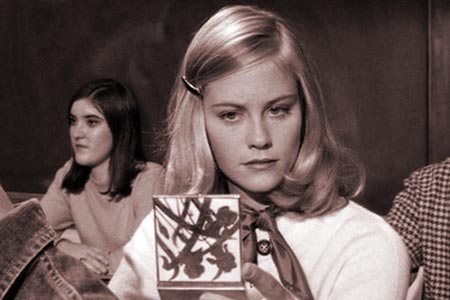
Nominated for eight Oscars and winning two, Peter Bogdanovich’s opus on small-town love and life also romanticises cinema and cinemas. The movie-theatre at the heart of the Texas town in Picture Show highlights the starker reality of its patrons and invites them to dream for better. In the case of central character Timothy Bottoms, that wish takes him away from the girlfriend he doesn’t love and into a May-December romance with Cloris Leachman. Meantime homecoming queen Cybil Shepherd is tempted away from the good-looking but potentially deadbeat Jeff Bridges by Randy Quaid’s naked swimming-pool party, where rich-kid Gary Brockette seems a better prospect, even though he won’t go out with a virgin. Shepherd’s meddling and indecision is set to create far harsher rifts between childhood friends Bottoms and Bridges, though…
Picture Show, like many rites-of-passage movies, presents its characters with the painful choice between pragmatism and romance, beauty and prosperity; no single person seems to have everything that any of the characters want, so it all comes down to which parts of their soul they’re willing to sell to buy happiness. Or at least to call what they’re buying happiness. The characters are in search of a nobler view of the world that they’re not mature enough to see, and so reduce each other to commodities and investments, wondering where the beauty of the silver screen is in their own lives. In the end, the theatre closes, an epitaphic gesture for their childhood ideals.
2: American Graffiti (1973)
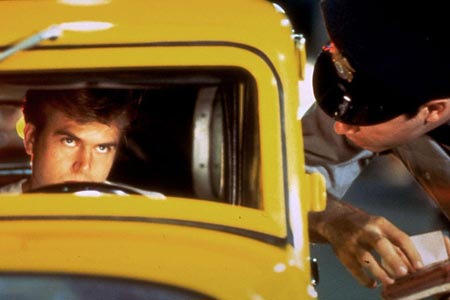
In 1950s California, Richard Dreyfuss, Ron Howard, Charlie Martin and Paul Le Mat are the inevitable ‘inseparable gang’ who are about to be separated by the encroaching real world. Their world is one of dares, dames and drag-strip escapades, but Dreyfus is off to college with Howard and having second thoughts about what he really wants. As if to confuse him further, he’s beguiled by a mysterious Lady In Red-style temptress (in the form of seventies sex-bomb Suzanne Somers in a T-Bird) so clearly he’s got a lot of road to cover yet.
Meantime LeMat has some to cover too – bad boy Harrison Ford is looking to cream him in a dangerous race down Paradise Road – with Ron Howard’s estranged girlfriend in the passenger seat…
It’s peculiarly hard to re-watch George Lucas’s tale of Californian delinquency without referencing the Star Wars movies that would follow on in three years and put ‘low-budget’ in Lucas’s rear-view mirror forever. Produced by Francis Ford Coppola, Graffiti is very much in the vein of 1970s ‘grit’ as defined by the pair, and by Martin Scorsese. So in a sense, you can’t help but wonder what more modest movies Lucas might have regaled us with – and even miss them. Dreyfus’s meeting with real-life gravel-voiced DJ Wolfman Jack is one of the best ‘advice to the young’ scenes in any rites-of-passage movie, brief though it is, and the film is practically permeated with the smell of gasoline and the intoxicating atmosphere of new and often dangerous roads ahead out of adolescence and innocence.
1: Big (1988)
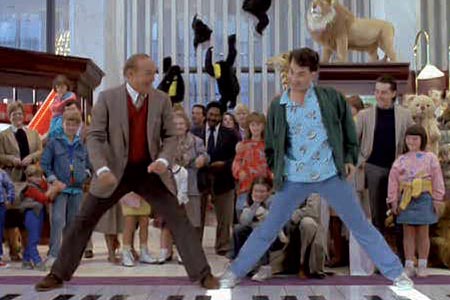
David Moscow is the romantically-challenged kid who asks a magic fairground machine to make him ‘big’, so he won’t be laughed at by the more physically mature girl he is attracted to. Before he knows it, he wakes up as a mid-thirties Tom Hanks, being chased out of his own house as an intruder by his mum! Having persuaded best friend Jared Rushton to help him (with some difficulty, given the circumstances), Hanks heads for the big city and parlays an entry level data-entry job into an executive position at a toy company – and a rather problematic possible affair with high-powered yuppie businesswoman Elizabeth Perkins…
It’s to director Penny Marshall’s credit that an adjective so short still finds her comedy-fantasy at the top of Google results for it. The genius of this movie is in mirroring the traditional ‘rites-of-passage’ message about ‘patience’ with a second layer suggesting that we may leave behind some pretty good traits we once had when we ‘toughen up’ for the cut-and-thrust of the adult world.
I know I keep mentioning Something Wicked This Way Comes, but not only is it the best coming-of-age book ever, in my opinion, but certain elements have been ‘re-used’ from it for Big, notably the carnival that can turn impatient little boys into men quickly – even if that’s not such a good idea. What Big most takes from Wicked, however, is a strong thread of sadness and poignancy about growing up and leaving childish things behind, and the ending remains hard-hitting, even if the earlier ‘silly string’ sequence between Hanks and Rushton makes a better mental image for the movie.
Honourable mentions:Something Wicked This Way Comes (1983) Ray Bradbury’s tale of two boys whose best-friendship is threatened by the symbolic arrival of the adult world (in the form of a dark travelling carnival) is one of the most lyrical and powerful works of literary fantasy, along with Nineteen-Eighty-Four. Unfortunately it needed a more committed adaptation that this rather hamstrung Disney version. Though Wicked was originally written as a movie project for Gene Kelly, stalwarts Jason Robards and Jonathan Pryce are mostly wasted, despite a superb scene where Price tempts Robards with renewed youth if he will give up the location of the boys.
The Breakfast Club (1985) I know that not putting this film in the main list will get me a complete FAIL from many (if not most), but hey-ho: I like Molly Ringwald, John Hughes and even Simple Minds, but this tale of detention gestalt is a major yawn; and it was at the time too. It’s like someone tried to spin a couple of psychology best-sellers from the airport newsagents into a meaningful movie, but Breakfast Club just comes off as cynical. Obviously Carley Tauchert doesn’t remotely agree with me…
Mean Girls (2004)Pretty In Pink (1986)The Karate Kid (1984) et al.Class (1983)The Prime of Miss Jean Brodie (1969)Diner (1982)The Goonies (1985)Quadrophenia (1979)Wish You Were Here (1987)The Night of the Hunter (1955)
Best UNMADE coming-of-age movies:
The Long Walk Frank Darabont apparently has this 1980s Stephen King short story (written as Richard Bachman) slated as a low-budget project between his higher-profile features, and it certainly has some cinematic potential. In a future right-wing society, a hundred boys volunteer for ‘The Long Walk’, wherein all must maintain a 4mph rate-of-walking on a journey down the East coast from Canada. Laggers are immediately shot dead by soldiers, and the marathon only finishes when there’s one competitor left – who will be granted pretty much anything he wants for the rest of his life. Along the journey, the boys are worn down psychologically as well as physically, and all their darkest secrets and fears emerge…
Hey, maybe this project got delayed because Fox want to see if it will actually fly as a reality show.
Catcher In The Rye J.D. Salinger’s tale of a ‘lost’ teen abroad in New York remains a powerful work even out of the context of its period and in the wake of many literary and cinematic imitators – but while he lives, it will not be filmed. This is attributed to Salinger’s horror at Samuel Goldwyn’s 1949 adaptation of the Salinger short story Uncle Wiggily in Connecticut, which emerged as the Oscar-nominated but faithless My Foolish Heart. Salinger never forgave Hollywood. He’s 90 this year, so don’t hold your breath that he’ll change his mind. What occurs out of the eventual estate, we’ll have to wait and see, but in my opinion this movie needed to be made about 1968 to have really had the greatest impact. If you’re desperate to see any filmic adaptation of Catcher, try this. It’s light on dialogue, though…
